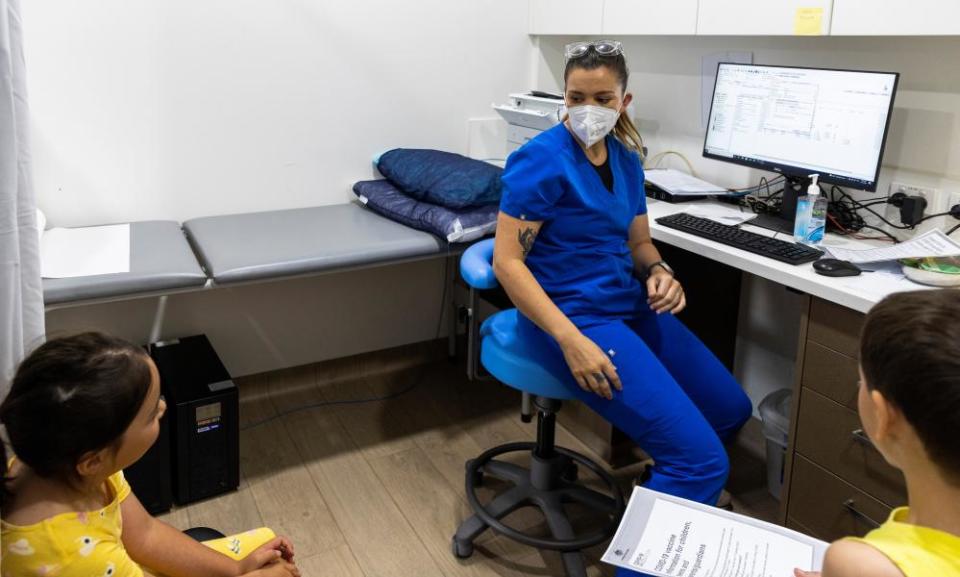‘Squandered any gains we made’: Australian clinics overwhelmed by rising Covid cases

Hit by staff shortages and tens of thousands of new cases daily, GPs remain under-resourced despite ‘enormous pressure’
A general practitioner in Victoria responsible for triaging Covid-positive patients and referring them to appropriate health services has said Australia “must now have one of the worst Covid responses in the world” as clinics are overwhelmed.
The doctor, who cannot be named due to fear of repercussions from his employer, said: “Australia has utterly squandered any gains we made during the pandemic … We are now seeing the sort of mess and chaos here that we saw in the UK at the start of Covid.”
The doctor’s role is to assess Covid-positive cases in the community and refer them to either community health services or GPs to support their care at home. In some cases he may assess they require an ambulance.
Related: ‘Outrageous’: retailers referred to AFP for price gouging rapid antigen tests
He said those patients who required GP care and prescriptions struggled to get a GP appointment due to staff shortages and clinics being fully booked, and paramedics were often so under pressure they could not take patients he believed required hospital treatment.
“There should be a dedicated pot of money given to assessment teams like mine so that we can just look after all the Covid patients ourselves, because while we have power to refer, we don’t have power to prescribe medications or administer care in their home,” he said. “This should be funded by federal and state governments, and adequately resourced to look after community care, because we desperately need to do something to take pressure off the GPs.”
The managing director of SIA medical centres in Victoria, Grace Sia, said all eight of her GP clinics were overwhelmed and that this was taking a particular toll on admin staff. At one point, clinic receptionists were fielding an average of 400 calls an hour from the community, Sia said. Demand is being exacerbated by staff shortages with GPs, clinic nurses and receptionists in isolation due to Covid.
“Our admin and reception staff are the ones who have to deal with everyone’s stressors, including from the doctors and the patients,” Sia said. “Patients will often be angry and abusive because their calls aren’t being answered or they can’t get an appointment.
“And when the government announces a new policy, we find out at the same time as the patients do, so we have no time to prepare. Patients then call us to find out what’s going on, as we are still trying to work out the detail ourselves. Everyone is burned out from this.”
The president of the Royal Australian College of General Practitioners, Dr Karen Price, said GPs are under “enormous pressure” as Covid cases increased by the tens of thousands daily.
“It is not business as usual,” she said.
“Practices are having to triage care … some patients may need to wait to get an appointment. General practice is also facing workforce shortages, like many other sectors, as practice teams are being exposed to Covid-19 outside the workplace.”
Price said she “cautiously welcomed” the government’s decision to allow asymptomatic close contacts who test negative to continue work to ease some of the staffing pressure on practices.
“However, staff and patient safety must not be compromised,” she said. “We believe there needs to be flexibility for workers to make decisions they are comfortable with in terms of when they return to work, depending on their personal circumstances. And all such workers should undergo routine testing, wear PPE and comply with public health directives.”
Related: The latest science on the Omicron variant
Dr Magdalena Simonis, a Melbourne GP, said at times her clinic was running with just 50% of its usual staff due to Covid. She said it was “unbelievable” that GP clinics did not have access to free rapid antigen tests for their staff and patients.
“We’re not preventing unvaccinated people from entering the practice of course, because it defeats the purpose of having people come in for vaccination or to have the counselling around vaccination,” Simonis said.
“So we’re seeing unvaccinated people and yet we do not have access to rapid antigen tests. It would help us if we were to screen patients who might have had contact and might be in a high risk situation, which might pose a risk to our staff, and ourselves as GPs. We’re in a consulting room usually with no windows, that are closed rooms, and though we wear masks, that doesn’t mean our risk is zero.”
Simonis warned that if GPs and reception staff continued to get sick with Covid or to suffer burnout, it would have repercussions for the hospital system.
“We always have been the gatekeepers to the tertiary health system,” she said. “If we are becoming unwell, and we can’t keep up with the load and we can’t manage patient expectations, then they will end up in hospitals. When GPs fall, the whole system breaks down.”
Do you know more? melissa.davey@theguardian.com

 Yahoo Movies
Yahoo Movies 